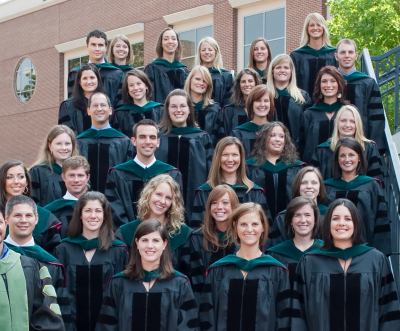 Belmont University has recently learned that 100% of graduates who received doctoral degrees from the School of Physical Therapy in 2009 have successfully passed, on their first attempt, the National Physical Therapy Examination (NPTE). This is the second time in the history of the program that an entire class has passed the exam on their first attempt, although Belmont graduates have achieved ultimate pass rates of 100% on the exam for the past 8 years. Individuals must pass the examination to receive certification or licensure as a physical therapist in the United States.
Belmont University has recently learned that 100% of graduates who received doctoral degrees from the School of Physical Therapy in 2009 have successfully passed, on their first attempt, the National Physical Therapy Examination (NPTE). This is the second time in the history of the program that an entire class has passed the exam on their first attempt, although Belmont graduates have achieved ultimate pass rates of 100% on the exam for the past 8 years. Individuals must pass the examination to receive certification or licensure as a physical therapist in the United States.
The national completion rate for the NPTE in 2008 (the latest year for which this data is available to the public) was 85%. A new passing standard was implemented in 2008 by the Federation of State Boards of Physical Therapy (FSBPT) who developed and administer the examination. Belmont University is one of five institutions in the state of Tennessee that are accredited by the Commission on Accreditation in Physical Therapy Education (CAPTE).
The NPTE consists of 250 multiple-choice questions, and must be completed within 5 hours. The major content areas covered by the exam for physical therapists are as follows: Patient Examination (52 questions); Evaluation, Diagnosis, Prognosis, and Outcomes (45 questions); Intervention (83 questions); and Standards of Care (20 questions).
“We like to say that our students are our credentials in the School of Physical Therapy,” said Dr. John Halle who directs the program and serves as Associate Dean. “It is the work and exceptional performance that our students and graduates demonstrate that allows us to use this description of our program with confidence. While true year to year, the Class of 2009 has gained a particular distinction, and on behalf of the faculty and staff, I am pleased to recognize their achievement.”
The School of Physical Therapy is part of the Gordon E. Inman College of Health Sciences & Nursing at Belmont University. Other schools and programs within the College include the School of Nursing, the School of Occupational Therapy, the School of Pharmacy, and the Social Work Department. The College educates future health professionals with a rigorous clinical-based curriculum and state-of-the-art technology and laboratories housed in a new health science complex that includes the Gordon E. Inman Building, the Health Care Simulation Center of Belmont University, and a soon-to-be-completed structure that doubles classroom and lab space and features a working pharmacy and center for health services.

